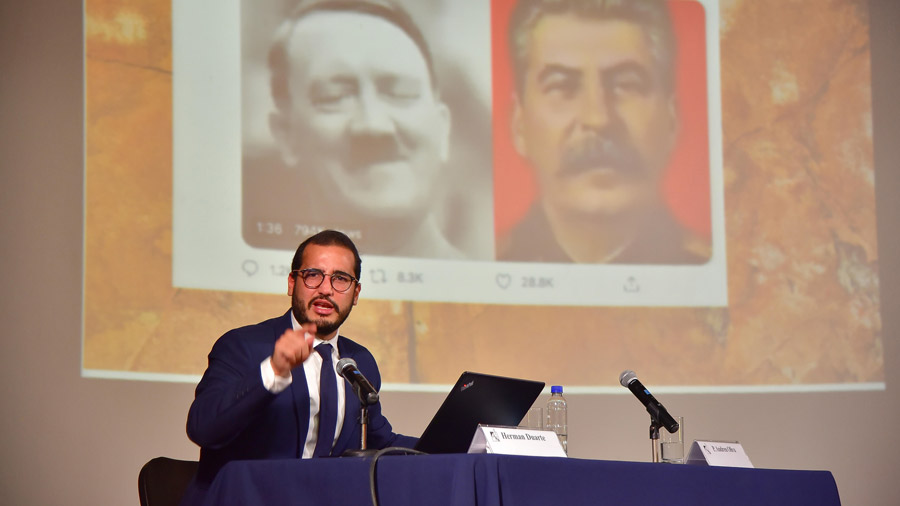
This is the main conclusion of a qualitative study presented yesterday at UCA.
The study of practices, tactics, and strategies that deliberately generate doubt, confusion, or ignorance among the population is known as agnotology.
The term was coined by Stanford University professor Robert Proctor in 2008 and was presented in the book Agnotology: The Making and Unmaking of Ignorance. Twelve years later, El Salvador has the first agnotological study in Central America entitled “Agnotology and Pandemic: A Case Study of Agnotological Practices in Response to COVID 19 by the Government of El Salvador.”
The investigation, conducted by Herman Duarte as part of his specialization in Human Rights at the London School of Economics (LSE), concludes that “the government of El Salvador has engaged in agnotology practices and these practices violate human rights.”
Read also: José Miguel Vivanco: President Bukele will end the party when the new government of Joe Biden enters, on January 20
To reach this conclusion, Duarte downloaded and classified 12,741 posts on Twitter and Facebook from the official accounts of President Nayib Bukele, the Presidential House and the Ministry of Health published between March 1 and July 1. Then he made an analysis of the thematic, discourse and semiotic content.
The study focused on identifying strategies that harm “the production of knowledge and how it affects people in different dimensions, starting with the right to have a clear, unmanipulated picture of reality.”
Distortion practices
The analysis allowed Duarte to identify three main themes and four types of agnotological strategies in the posts on Twitter and Facebook.
“In this context, the Government of El Salvador is based on the following strategies: secrecy; use of faith; actions that could be considered as part of the “Tobacco Strategy”; and misinformation. The so-called “Tobacco Strategy” is the practices implemented by the tobacco industry in the last decades of the twentieth century to question the fact that smoking is harmful to health. These include: distortion of scientific studies, funding of favorable studies and discredit or attacks on critics.
These strategies, according to Duarte, were also used by the government. An example in this sense was what happened when thousands of Salvadorans were sent to the so-called isolation centers after returning to the country or for non-compliance with the strict quarantine established by the Executive. Some were deprived of their liberty for 40 days or more.
On March 14, President Bukele wrote on Twitter: “Most people in quarantine are already in shelters with excellent conditions …”. After several protests, three days later, the president added: “Most people are quarantined in hotel rooms, paid by the government at a special price.”
Read more: Former lawyer David Morales: Bukele attacks human rights defenders and the power of military power
On April 17, with various resolutions from the Constitutional Chamber, the president wrote on Twitter: “Does anyone think we want to keep them in a 4-star hotel for sports? No, some of them are potential positive cases. Others are positive links. To release them would be to spread the virus. “
That day, a woman begged for her freedom from the hotel window. He had an indicator that said he was going crazy after 39 days of detention and 3 negative COVID-19 tests. On May 10, in front of that building, a group of mariachis were singing to the imprisoned mothers. The study states: “These photos were published (and deleted) in the official account of the Government Communication Secretariat. Why not let them go? The incubation period has already been long overdue, as there are cases of 50 days in captivity.
“I hope that Nelson Mandela’s spirit of harmony and reconciliation will inspire his actions, that the wisdom of his father, Don Armando Bukele, will guide him in making decisions and that he will never forget the moral and constitutional appeal he must make. peace and social harmony. He is still in time to regain the energy and mysticism with which he began his administration and which was lost on February 9. “
Previous tweets and the image of mariachis in front of the isolation center, which Duarte considers “surreal”, lead him to ask: are isolation centers a punishment or a demonstration of “hard love”?
Then he himself replies: “Although a professor at the American University has practically denied the occurrence of human rights violations (Schamis & Chirinos, 2020), the decisions of the Constitutional Chamber tell a different story and, in any case, a more reliable one.”
The narrative around isolation centers is not an isolated case. Rather, it was repeated when the government offered internet access to a young man who climbed the branches of a tree to receive a signal. A necessary action, but which did not solve the lack of Internet access for thousands of other students.
The study’s findings state: “These acts belong to a unit, a discourse that is created by uniting thousands of interactions and millions of cases of socializing the mentioned messages that include: insults to the political opposition, discrediting national and international human rights organizations; indirect censorship by civil society; localized harassment of the press; strategic misinformation placed to create chaos and gain power; the deliberate decision not to comply with the constitutional obligations issued from office; or simple actions not to take responsibility for failures in pandemic management ”.
At the end, Duarte includes a message for the president: “I hope that Nelson Mandela’s spirit of harmony and reconciliation will inspire his actions, that the wisdom of his father, Don Armando Bukele, will guide him in making decisions; and never forget the moral and constitutional calling that it must be an instrument of peace and social harmony. It is still time to regain the energy and mysticism with which he began his administration and which was lost on February 9 “.
If you want a digital copy of the study, which consists of 161 pages, write to e-mail: [email protected]